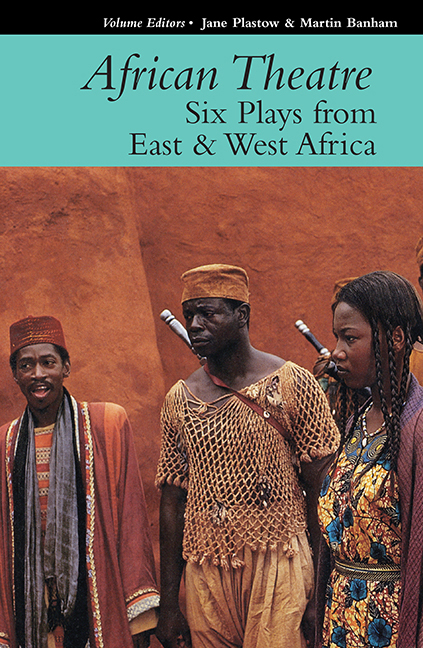Book contents
- Frontmatter
- Contents
- Notes on Contributors
- Obituary: Adieu Alain Ricard
- Preface
- THREE PLAYS FROM EAST AFRICA
- The translation & transcription of transcription of Mother Uganda & Her Children
- Mother Uganda & Her Children
- The context & making of Rose Mbowa's Mother Uganda & Her Children
- Majangwa: A Promise of Rains
- Notions of indigeneity: Uganda's Robert Serumaga
- The Guest (Engida): A One Act Play
- An Absurdist in Addis Ababa: Manyazewal Endeshaw's Engida
- THREE PLAYS FROM WEST AFRICA
- Book Reviews
The context & making of Rose Mbowa's Mother Uganda & Her Children
from THREE PLAYS FROM EAST AFRICA
Published online by Cambridge University Press: 24 August 2019
- Frontmatter
- Contents
- Notes on Contributors
- Obituary: Adieu Alain Ricard
- Preface
- THREE PLAYS FROM EAST AFRICA
- The translation & transcription of transcription of Mother Uganda & Her Children
- Mother Uganda & Her Children
- The context & making of Rose Mbowa's Mother Uganda & Her Children
- Majangwa: A Promise of Rains
- Notions of indigeneity: Uganda's Robert Serumaga
- The Guest (Engida): A One Act Play
- An Absurdist in Addis Ababa: Manyazewal Endeshaw's Engida
- THREE PLAYS FROM WEST AFRICA
- Book Reviews
Summary
Introduction
Mother Uganda and Her Children was a music-dance-drama production developed by Rose Mbowa in 1987 with a cast drawn from the Music, Dance and Drama Department (MDD) of Makerere University. Until now existing only in the memories of a few and on some partial and poor quality VHS tapes, the script never having been written down, the play has a big place in the mythology of modern Uganda theatre. Mother Uganda was produced at a moment of historical and political challenge and supported by the incoming – and still in power 30 years later – government of Yoweri Museveni. The manner of its production was highly controversial at the time, challenging institutional, academic, political and personal loyalties. In line with a favoured Mbowa play-making methodology Mother Uganda was an improvisational collective production. It was unique in that it drew on some ten indigenous dance and music cultures to advance an agenda of national reconciliation, reconstruction and unity. Rose Mbowa, arguably Uganda's leading theatrical figure at the time, made a piece that traverses boundaries between popular musical theatre, indigenous dance-drama forms, political theatre, theatre in education and theatre for development as it appealed to unity across ethnic diversity, the possibility of human reformation, and the need for a rapid move towards the embedding of women's rights.
My relationship with Mother Uganda – Patrick
Reflecting on, and writing about, Mother Uganda and Her Children has made me consider my history of working with Rose Mbowa. I was Rose's student from 1984 to 1988, and then I worked with her as a teacher at Makerere University in MDD from 1991 to 1999, when she sadly and suddenly passed on. I acted in her Nalumansi Mother of Lukabwe in 1985. As a student I observed the development of Mother Uganda and Her Children in 1987, and then performed in Mine by Right in 1989. I was subsequently employed by the rival dance-drama Ndere Troupe as Executive Director but soon lost the job, being told I was ‘too close to Rose Mbowa'. Writing about Mother Uganda and Her Children is therefore informed by my experiences as a participant, a colleague and an observer of Mbowa's work.
- Type
- Chapter
- Information
- African Theatre 16: Six Plays from East & West Africa , pp. 50 - 61Publisher: Boydell & BrewerPrint publication year: 2017
- 1
- Cited by

